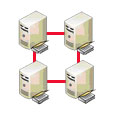LAS VEGAS — There is a serious vulnerability  in all versions of the current release of BIND, a widely deployed name server, that can be used to force DNS servers to quit without warning. Experts say there also is an exploit for the vulnerability that is already circulating widely online.
in all versions of the current release of BIND, a widely deployed name server, that can be used to force DNS servers to quit without warning. Experts say there also is an exploit for the vulnerability that is already circulating widely online.
The BIND vulnerability is in version 9 of the software, and the Internet Systems Consortium, which maintains BIND, said there is no workaround for the problem.
Receipt of a specially-crafted dynamic update message to a zone for which the server is the master may cause BIND 9 servers to exit. Testing indicates that the attack packet has to be formulated against a zone for which that machine is a master. Launching the attack against slave zones does not trigger the assert.
This vulnerability affects all servers that are masters for one or more zones – it is not limited to those that are configured to allow dynamic updates. Access controls will not provide an effective workaround.
dns_db_findrdataset() fails when the prerequisite section of the dynamic update message contains a record of type “ANY” and where at least one RRset for this FQDN exists on the server.
The ISC has released updated versions of the software that contain a fix for the problem: versions 9.4.3-P3, 9.5.1-P3 and 9.6.1-P1.









